医学心理学medicalpsychology00001
- 格式:ppt
- 大小:584.50 KB
- 文档页数:7
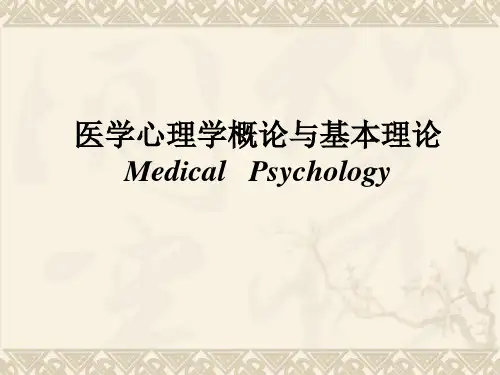

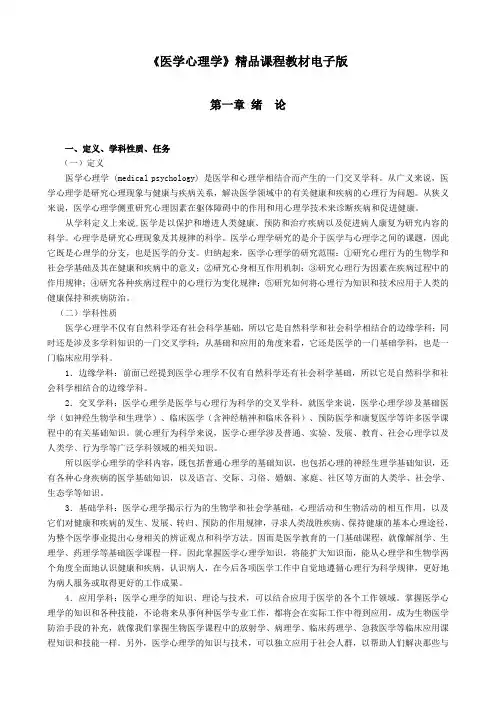
《医学心理学》精品课程教材电子版第一章绪论一、定义、学科性质、任务(一)定义医学心理学(medical psychology) 是医学和心理学相结合而产生的一门交叉学科。
从广义来说,医学心理学是研究心理现象与健康与疾病关系,解决医学领域中的有关健康和疾病的心理行为问题。
从狭义来说,医学心理学侧重研究心理因素在躯体障碍中的作用和用心理学技术来诊断疾病和促进健康。
从学科定义上来说,医学是以保护和增进人类健康、预防和治疗疾病以及促进病人康复为研究内容的科学。
心理学是研究心理现象及其规律的科学。
医学心理学研究的是介于医学与心理学之间的课题,因此它既是心理学的分支,也是医学的分支。
归纳起来,医学心理学的研究范围:①研究心理行为的生物学和社会学基础及其在健康和疾病中的意义;②研究心身相互作用机制;③研究心理行为因素在疾病过程中的作用规律;④研究各种疾病过程中的心理行为变化规律;⑤研究如何将心理行为知识和技术应用于人类的健康保持和疾病防治。
(二)学科性质医学心理学不仅有自然科学还有社会科学基础,所以它是自然科学和社会科学相结合的边缘学科;同时还是涉及多学科知识的一门交叉学科;从基础和应用的角度来看,它还是医学的一门基础学科,也是一门临床应用学科。
1.边缘学科:前面已经提到医学心理学不仅有自然科学还有社会科学基础,所以它是自然科学和社会科学相结合的边缘学科。
2.交叉学科:医学心理学是医学与心理行为科学的交叉学科。
就医学来说,医学心理学涉及基础医学(如神经生物学和生理学)、临床医学(含神经精神和临床各科)、预防医学和康复医学等许多医学课程中的有关基础知识。
就心理行为科学来说,医学心理学涉及普通、实验、发展、教育、社会心理学以及人类学、行为学等广泛学科领域的相关知识。
所以医学心理学的学科内容,既包括普通心理学的基础知识,也包括心理的神经生理学基础知识,还有各种心身疾病的医学基础知识,以及语言、交际、习俗、婚姻、家庭、社区等方面的人类学、社会学、生态学等知识。
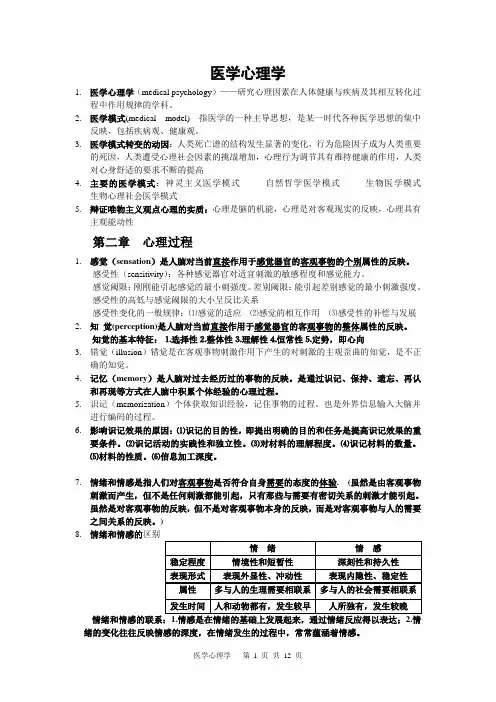
医学心理学1.医学心理学(medical psychology)——研究心理因素在人体健康与疾病及其相互转化过程中作用规律的学科。
2.医学模式(medical model)---指医学的一种主导思想,是某一时代各种医学思想的集中反映,包括疾病观、健康观。
3.医学模式转变的动因:人类死亡谱的结构发生显著的变化,行为危险因子成为人类重要的死因,人类遭受心理社会因素的挑战增加,心理行为调节具有维持健康的作用,人类对心身舒适的要求不断的提高4.主要的医学模式:神灵主义医学模式自然哲学医学模式生物医学模式生物心理社会医学模式5.辩证唯物主义观点心理的实质:心理是脑的机能,心理是对客观现实的反映,心理具有主观能动性第二章心理过程1.感觉(sensation)是人脑对当前直接作用于感觉器官的客观事物的个别属性的反映。
感受性(sensitivity):各种感觉器官对适宜刺激的敏感程度和感觉能力。
感觉阈限:刚刚能引起感觉的最小刺强度。
差别阈限:能引起差别感觉的最小刺激强度。
感受性的高低与感觉阈限的大小呈反比关系感受性变化的一般规律:⑴感觉的适应⑵感觉的相互作用⑶感受性的补偿与发展2.知觉(perception)是人脑对当前直接作用于感觉器官的客观事物的整体属性的反映。
知觉的基本特征:⒈选择性⒉整体性⒊理解性⒋恒常性⒌定势,即心向3.错觉(illusion)错觉是在客观事物刺激作用下产生的对刺激的主观歪曲的知觉,是不正确的知觉。
4.记忆(memory)是人脑对过去经历过的事物的反映。
是通过识记、保持、遗忘、再认和再现等方式在人脑中积累个体经验的心理过程。
5.识记(memorization)个体获取知识经验,记住事物的过程。
也是外界信息输入大脑并进行编码的过程。
6.影响识记效果的原因:⑴识记的目的性,即提出明确的目的和任务是提高识记效果的重要条件。
⑵识记活动的实践性和独立性。
⑶对材料的理解程度。
⑷识记材料的数量。
⑸材料的性质。
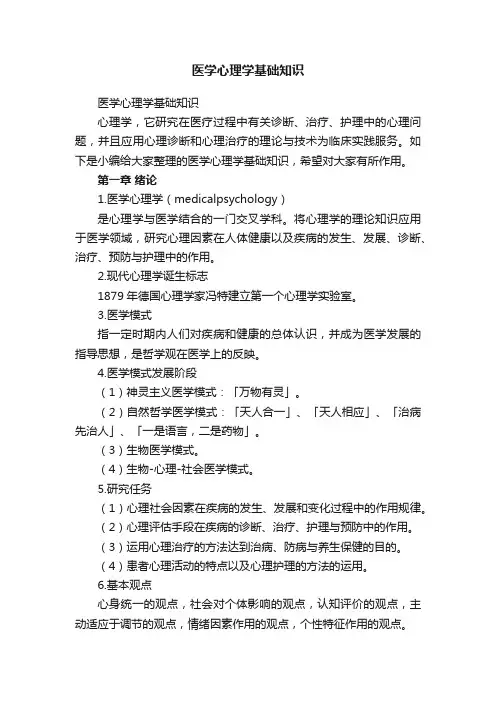
医学心理学基础知识医学心理学基础知识心理学,它研究在医疗过程中有关诊断、治疗、护理中的心理问题,并且应用心理诊断和心理治疗的理论与技术为临床实践服务。
如下是小编给大家整理的医学心理学基础知识,希望对大家有所作用。
第一章绪论1.医学心理学(medicalpsychology)是心理学与医学结合的一门交叉学科。
将心理学的理论知识应用于医学领域,研究心理因素在人体健康以及疾病的发生、发展、诊断、治疗、预防与护理中的作用。
2.现代心理学诞生标志1879年德国心理学家冯特建立第一个心理学实验室。
3.医学模式指一定时期内人们对疾病和健康的总体认识,并成为医学发展的指导思想,是哲学观在医学上的反映。
4.医学模式发展阶段(1)神灵主义医学模式:「万物有灵」。
(2)自然哲学医学模式:「天人合一」、「天人相应」、「治病先治人」、「一是语言,二是药物」。
(3)生物医学模式。
(4)生物-心理-社会医学模式。
5.研究任务(1)心理社会因素在疾病的发生、发展和变化过程中的作用规律。
(2)心理评估手段在疾病的诊断、治疗、护理与预防中的作用。
(3)运用心理治疗的方法达到治病、防病与养生保健的目的。
(4)患者心理活动的特点以及心理护理的方法的运用。
6.基本观点心身统一的观点,社会对个体影响的观点,认知评价的观点,主动适应于调节的观点,情绪因素作用的观点,个性特征作用的观点。
7.研究对象针对人的疾病和健康及其相互转化过程中所涉及的各种心理行为问题以及解决这些问题的方法和措施。
8.研究方法按研究涉及时间分为横断研究、纵向研究、回顾研究、前瞻研究(重要);按研究手段分为观察法、调查法、测验法、个案法、相关法、实验法。
9.医学心理学建立标志1852年法国的洛采出版了第一部《医学心理学》,1896年美国宾夕法尼亚州建立第一个临床心理诊所。
第二章心理的生物学基础1.心理学是研究心理现象发生、发展规律的科学。
2.心理现象的分类心理过程和人格,是两个统一不可分割的方面。
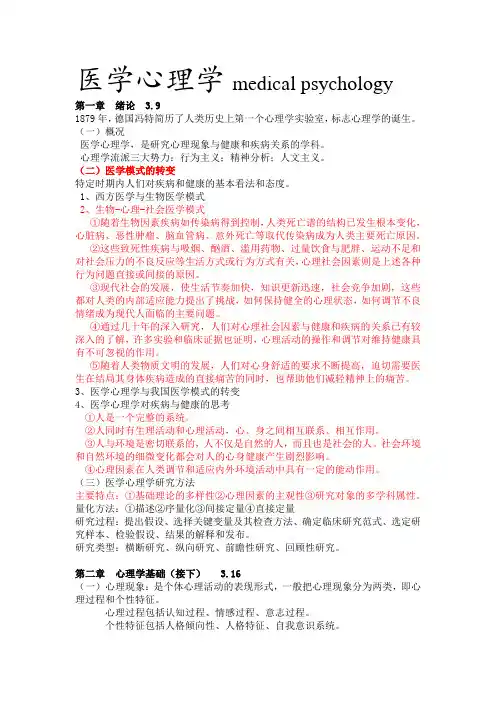
医学心理学medical psychology 第一章绪论 3.91879年,德国冯特简历了人类历史上第一个心理学实验室,标志心理学的诞生。
(一)概况医学心理学,是研究心理现象与健康和疾病关系的学科。
心理学流派三大势力:行为主义;精神分析;人文主义。
(二)医学模式的转变特定时期内人们对疾病和健康的基本看法和态度。
1、西方医学与生物医学模式2、生物-心理-社会医学模式①随着生物因素疾病如传染病得到控制,人类死亡谱的结构已发生根本变化,心脏病、恶性肿瘤、脑血管病、意外死亡等取代传染病成为人类主要死亡原因。
②这些致死性疾病与吸烟、酗酒、滥用药物、过量饮食与肥胖、运动不足和对社会压力的不良反应等生活方式或行为方式有关,心理社会因素则是上述各种行为问题直接或间接的原因。
③现代社会的发展,使生活节奏加快,知识更新迅速,社会竞争加剧,这些都对人类的内部适应能力提出了挑战,如何保持健全的心理状态,如何调节不良情绪成为现代人面临的主要问题。
④通过几十年的深入研究,人们对心理社会因素与健康和疾病的关系已有较深入的了解,许多实验和临床证据也证明,心理活动的操作和调节对维持健康具有不可忽视的作用。
⑤随着人类物质文明的发展,人们对心身舒适的要求不断提高,迫切需要医生在结局其身体疾病造成的直接痛苦的同时,也帮助他们减轻精神上的痛苦。
3、医学心理学与我国医学模式的转变4、医学心理学对疾病与健康的思考①人是一个完整的系统。
②人同时有生理活动和心理活动,心、身之间相互联系、相互作用。
③人与环境是密切联系的,人不仅是自然的人,而且也是社会的人。
社会环境和自然环境的细微变化都会对人的心身健康产生剧烈影响。
④心理因素在人类调节和适应内外环境活动中具有一定的能动作用。
(三)医学心理学研究方法主要特点:①基础理论的多样性②心理因素的主观性③研究对象的多学科属性。
量化方法:①描述②序量化③间接定量④直接定量研究过程:提出假设、选择关键变量及其检查方法、确定临床研究范式、选定研究样本、检验假设、结果的解释和发布。
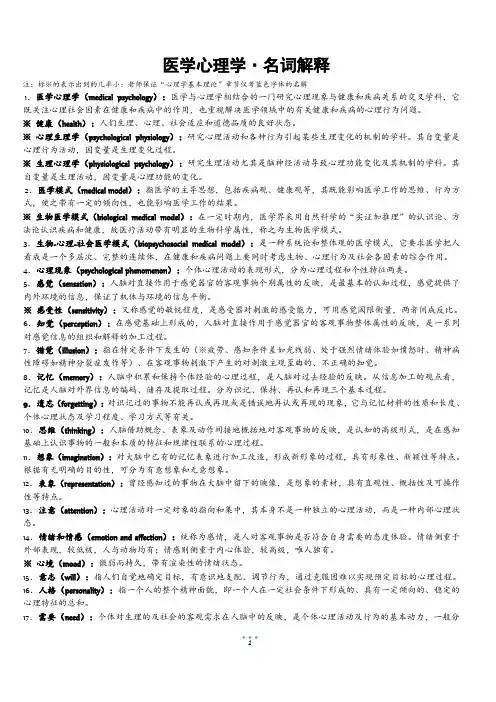
医学心理学·名词解释注:标※的表示出到的几率小;老师保证“心理学基本理论”章节仅考蓝色字体的名解1.医学心理学(medical psychology):医学与心理学相结合的一门研究心理现象与健康和疾病关系的交叉学科,它既关注心理社会因素在健康和疾病中的作用,也重视解决医学领域中的有关健康和疾病的心理行为问题。
※健康(health):人们生理、心理、社会适应和道德品质的良好状态。
※心理生理学(psychological physiology):研究心理活动和各种行为引起某些生理变化的机制的学科。
其自变量是心理行为活动,因变量是生理变化过程。
※生理心理学(physiological psychology):研究生理活动尤其是脑神经活动导致心理功能变化及其机制的学科。
其自变量是生理活动,因变量是心理功能的变化。
2.医学模式(medical model):指医学的主导思想,包括疾病观、健康观等,其既能影响医学工作的思维、行为方式,使之带有一定的倾向性,也能影响医学工作的结果。
※生物医学模式(biological medical model):在一定时期内,医学界采用自然科学的“实证加推理”的认识论、方法论认识疾病和健康,故医疗活动带有明显的生物科学属性,称之为生物医学模式。
3.生物-心理-社会医学模式(biopsychosocial medical model):是一种系统论和整体观的医学模式,它要求医学把人看成是一个多层次、完整的连续体,在健康和疾病问题上要同时考虑生物、心理行为及社会各因素的综合作用。
4.心理现象(psychological phenomenon):个体心理活动的表现形式,分为心理过程和个性特征两类。
5.感觉(sensation):人脑对直接作用于感觉器官的客观事物个别属性的反映,是最基本的认知过程,感觉提供了内外环境的信息,保证了机体与环境的信息平衡。
※感受性(sensitivity):又称感觉的敏锐程度,是感受器对刺激的感受能力,可用感觉阈限衡量,两者间成反比。
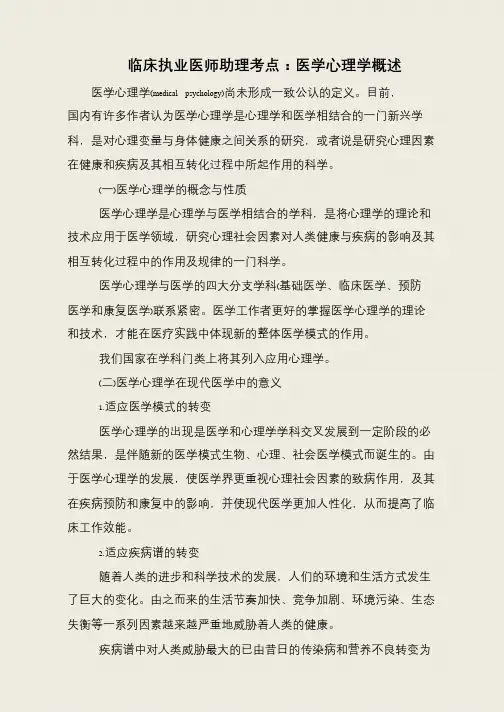
临床执业医师助理考点:医学心理学概述医学心理学(medical psychology)尚未形成一致公认的定义。
目前,国内有许多作者认为医学心理学是心理学和医学相结合的一门新兴学科,是对心理变量与身体健康之间关系的研究,或者说是研究心理因素在健康和疾病及其相互转化过程中所起作用的科学。
(一)医学心理学的概念与性质
医学心理学是心理学与医学相结合的学科,是将心理学的理论和技术应用于医学领域,研究心理社会因素对人类健康与疾病的影响及其相互转化过程中的作用及规律的一门科学。
医学心理学与医学的四大分支学科(基础医学、临床医学、预防
医学和康复医学)联系紧密。
医学工作者更好的掌握医学心理学的理论
和技术,才能在医疗实践中体现新的整体医学模式的作用。
我们国家在学科门类上将其列入应用心理学。
(二)医学心理学在现代医学中的意义
1.适应医学模式的转变
医学心理学的出现是医学和心理学学科交叉发展到一定阶段的必然结果,是伴随新的医学模式生物、心理、社会医学模式而诞生的。
由于医学心理学的发展,使医学界更重视心理社会因素的致病作用,及其在疾病预防和康复中的影响,并使现代医学更加人性化,从而提高了临床工作效能。
2.适应疾病谱的转变
随着人类的进步和科学技术的发展,人们的环境和生活方式发生了巨大的变化。
由之而来的生活节奏加快、竞争加剧、环境污染、生态失衡等一系列因素越来越严重地威胁着人类的健康。
疾病谱中对人类威胁最大的已由昔日的传染病和营养不良转变为。
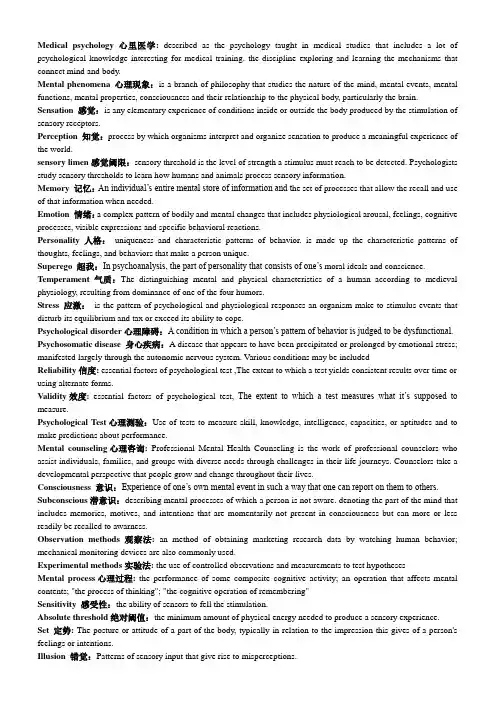
Medical psychology 心里医学:described as the psychology taught in medical studies that includes a lot of psychological knowledge interesting for medical training. the discipline exploring and learning the mechanisms that connect mind and body.Mental phenomena 心理现象:is a branch of philosophy that studies the nature of the mind, mental events, mental functions, mental properties, consciousness and their relationship to the physical body, particularly the brain. Sensation 感觉:is any elementary experience of conditions inside or outside the body produced by the stimulation of sensory receptors.Perception 知觉:process by which organisms interpret and organize sensation to produce a meaningful experience of the world.sensory limen感觉阈限:sensory threshold is the level of strength a stimulus must reach to be detected. Psychologists study sensory thresholds to learn how humans and animals process sensory information.Memory 记忆:An individual’s entire mental store of information and t he set of processes that allow the recall and use of that information when needed.Emotion 情绪:a complex pattern of bodily and mental changes that includes physiological arousal, feelings, cognitive processes, visible expressions and specific behavioral reactions.Personality 人格:uniqueness and characteristic patterns of behavior. is made up the characteristic patterns of thoughts, feelings, and behaviors that make a person unique.Superego 超我:In psychoanalysis, the part of personality that consists of one’s moral ideals and conscience. Temperament 气质:The distinguishing mental and physical characteristics of a human according to medieval physiology, resulting from dominance of one of the four humors.Stress 应激:is the pattern of psychological and physiological responses an organism make to stimulus events that disturb its equilibrium and tax or exceed its ability to cope.Psychological disorder心理障碍:A condition in which a person’s pattern of behavior is judged to be dysfunctional. Psychosomatic disease 身心疾病:A disease that appears to have been precipitated or prolonged by emotional stress; manifested largely through the autonomic nervous system. Various conditions may be includedReliability信度: essential factors of psychological test ,The extent to which a test yields consistent results over time or using alternate forms.Validity效度:essential factors of psychological test, The extent to which a test measures what it’s supposed to measure.Psychological Test心理测验:Use of tests to measure skill, knowledge, intelligence, capacities, or aptitudes and to make predictions about performance.Mental counseling心理咨询: Professional Mental Health Counseling is the work of professional counselors who assist individuals, families, and groups with diverse needs through challenges in their life journeys. Counselors take a developmental perspective that people grow and change throughout their lives.Consciousness 意识:Experience of one’s own mental event in such a way that one can report on them to others. Subconscious潜意识:describing mental processes of which a person is not aware. denoting the part of the mind that includes memories, motives, and intentions that are momentarily not present in consciousness but can more or less readily be recalled to awarness.Observation methods观察法:an method of obtaining marketing research data by watching human behavior; mechanical monitoring devices are also commonly used.Experimental methods实验法: the use of controlled observations and measurements to test hypothesesMental process心理过程:the performance of some composite cognitive activity; an operation that affects mental contents; "the process of thinking"; "the cognitive operation of remembering"Sensitivity 感受性:the ability of sensors to fell the stimulation.Absolute threshold绝对阈值:the minimum amount of physical energy needed to produce a sensory experience.Set 定势: The posture or attitude of a part of the body, typically in relation to the impression this gives of a person's feelings or intentions.Illusion 错觉:Patterns of sensory input that give rise to misperceptions.Attention注意:Notice taken of someone or something; the regarding of someone or something as interesting or important.Thinking思维:The process of using one's mind to consider or reason about something.Divergent thinking发散思维:is a thought process or method used to generate creative ideas by exploring many possible solutions. It is often used in conjunction with convergent thinking, which follows a particular set of logical steps to arrive at one "correct" solution.Emotion regulation情绪调节: is being able to properly regulate one's emotions. It is a complex process that involves the initiating, inhibiting, or modulating the following aspects of functioning: internal feeling states.Motives 动机:needs, wants, desires leading to goal-directed behavior.Need需求: Require (something) because it is essential or very important, Expressing necessity or obligation.Ability能力: the quality of being able to perform, a quality that permits or facilitates achievement or accomplishment. Intelligence智力:the ability to learn or understand or to deal with new or trying situations, the ability to apply knowledge to manipulate one’s environment or think abstractly as measured by objective criteria.Id 本我:In psychoanalysis, a primitive and unconscious part of personality that contains basic drives and operates according to the pleasure principle.Ego 自我:In psychoanalysis, the part of personality that operates according to the reality principle and mediates the conflict between the id and superego.Character 性格:one of the attributes or features that make up and distinguish an individual, the complex of mental and ethical traits marking and often individualizing a person, group, or nation.Mental health心理健康: the psychological state of someone who is functioning at a satisfactory level of emotional and behavioral adjustment.general adaptation syndrome 全身适应综合征:or GAS, is a term used to describe the body's short-term andlong-term reactions to stress.Psychosomatic response心身反应: is the reaction of the mind that creates a physical condition change just from the belief that something has actually happened. In medicine, it's known as the placebo effect.psychosexual disorder性心理障碍:is a term which may simply refer to a sexual problem that is psychological, rather than physiological, in origin.Neurosis 神经症:a mental and emotional disorder that affects only part of the personality, is accompanied by a less distorted perception of reality than in a psychosis, does not result in disturbance of the use of language, and is accompanied by various physical, physiological, and mental disturbancesPersonality disorder 人格障碍:Any of various disorders characterized by abnormal behavior rather than by neurotic, psychotic, or mental disturbances.Psychotherapy心理治疗:is an intentional interpersonal relationship used by trained psychotherapists to aid a client or patient to improve the mental health, or to improve group relationships.Patient’s role患者角色: when patients take more responsibility and initiative, and when they put more effort into improving their health-related habits and self-management skillsDoctor’s role医生角色: Your doctor can tell you what treatments may help you and how they work. Your doctor is responsible for explaining to you, in terms you can understand.Compliance依从性:is terms that refer to the degree to which patients carry out the behaviors and treatments their practitioners recommended.Doctor patient’s relationship医患关系: The doctor-patient relationship is central to the practice of healthcare and is essential for the delivery of high-quality health care in the diagnosis and treatment of disease. The doctor-patient relationship forms one of the foundations of contemporary medical ethics. Most universities teach students from the beginning, even before they set foot in hospitals, to maintain a professional rapport with patients, uphold patients’ dignity, and respect their privacyPsychology assessment心理评估:is applying psychological theory and method to evaluate people’s psychological quality and level.Item analysis项目分析: Analyzing each item on a test to determine the proportions of students selecting each answer.Can be used to evaluate student strengths and weaknesses; may point to problems with the test's validity and to possible bias.Norm常模:The procedure by which existing norms are used to interpret an individual’s test score.Systemic desensitization系统脱敏疗法:is a type of behavioral therapy used in the field of psychology to help effectively overcome phobias and other anxiety disorders.Cognitive Process认识过程:general term for all forms of knowing. The ways in which people acquire knowledge and use it to shape and understand their experiences in the world.life event生活事件:Any major change in person's circumstances–eg, divorce, death of spouse, loss of job, etc, that affects interpersonal relationships, work-related, leisure or recreational activitie.Test-retest reliability: The degree to which a test yields consistent results when re-administered at a later time.Split-half reliability: The degree to which alternate forms of a test yield consistent result.Content validity: The extent to which a test measures what it’s supposed to measure.Criterion validity: The extent to which a test can predict a concurrent or future outcome.。
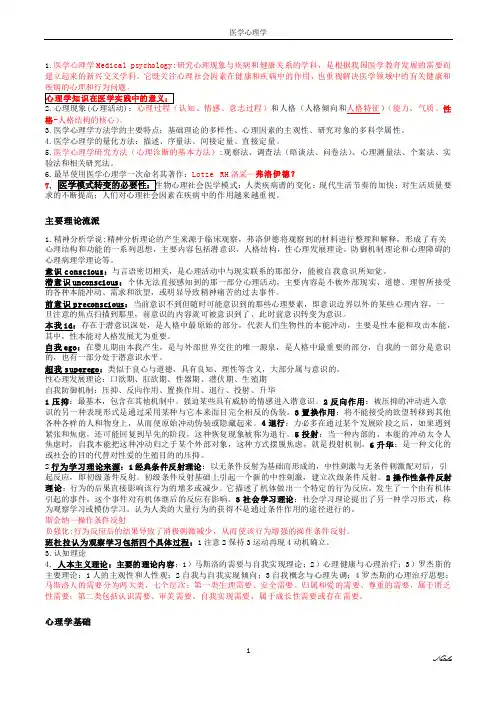
1.医学心理学Medical psychology:研究心理现象与疾病和健康关系的学科,是根据我国医学教育发展的需要而建立起来的新兴交叉学科,它既关注心理社会因素在健康和疾病中的作用,也重视解决医学领域中的有关健康和和人格(人格倾向和人格特征)(能力、气质、性格-人格结构的核心)。
3.医学心理学方法学的主要特点:基础理论的多样性、心理因素的主观性、研究对象的多科学属性。
4.医学心理学的量化方法:描述、序量法、间接定量、直接定量。
5.医学心理学研究方法(心理诊断的基本方法):观察法、调查法(晤谈法、问卷法)、心理测量法、个案法、实验法和相关研究法。
6.Lotze RH洛采—弗洛伊德?7.现代生活节奏的加快;对生活质量要主要理论流派1.精神分析学说:精神分析理论的产生来源于临床观察,弗洛伊德将观察到的材料进行整理和解释,形成了有关心理结构和功能的一系列思想,主要内容包括潜意识,人格结构,性心理发展理论,防御机制理论和心理障碍的心理病理学理论等。
意识conscious:与言语密切相关,是心理活动中与现实联系的那部分,能被自我意识所知觉。
潜意识unconscious:个体无法直接感知到的那一部分心理活动,主要内容是不被外部现实、道德、理智所接受的各种本能冲动、需求和欲望,或明显导致精神痛苦的过去事件。
前意识preconscious:当前意识不到但随时可能意识到的那些心理要素,即意识边界以外的某些心理内容,一旦注意的焦点扫描到那里,前意识的内容就可被意识到了,此时前意识转变为意识。
本我id:存在于潜意识深处,是人格中最原始的部分,代表人们生物性的本能冲动,主要是性本能和攻击本能,其中,性本能对人格发展尤为重要。
自我ego:在婴儿期由本我产生,是与外部世界交往的唯一源泉,是人格中最重要的部分,自我的一部分是意识的,也有一部分处于潜意识水平。
超我superego:类似于良心与道德,具有良知、理性等含义,大部分属与意识的。
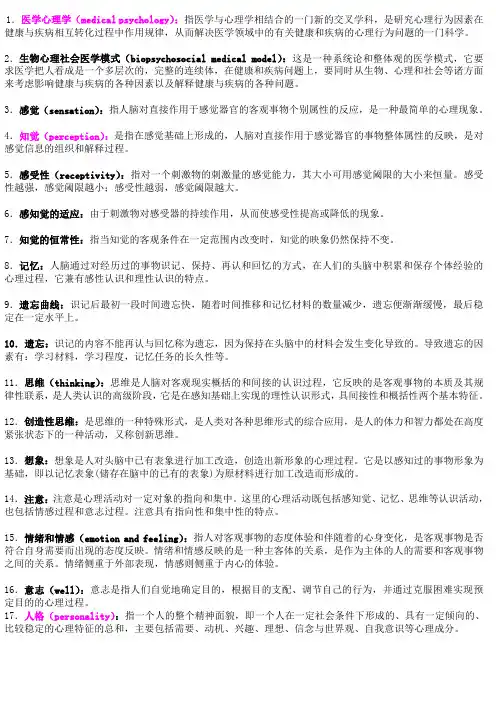
1.医学心理学(medical psychology):指医学与心理学相结合的一门新的交叉学科,是研究心理行为因素在健康与疾病相互转化过程中作用规律,从而解决医学领域中的有关健康和疾病的心理行为问题的一门科学。
2.生物心理社会医学模式(biopsychosocial medical model):这是一种系统论和整体观的医学模式,它要求医学把人看成是一个多层次的,完整的连续体,在健康和疾病问题上,要同时从生物、心理和社会等诸方面来考虑影响健康与疾病的各种因素以及解释健康与疾病的各种问题。
3.感觉(sensation):指人脑对直接作用于感觉器官的客观事物个别属性的反应,是一种最简单的心理现象。
4.知觉(perception):是指在感觉基础上形成的,人脑对直接作用于感觉器官的事物整体属性的反映,是对感觉信息的组织和解释过程。
5.感受性(receptivity):指对一个刺激物的刺激量的感觉能力,其大小可用感觉阈限的大小来恒量。
感受性越强,感觉阈限越小;感受性越弱,感觉阈限越大。
6.感知觉的适应:由于刺激物对感受器的持续作用,从而使感受性提高或降低的现象。
7.知觉的恒常性:指当知觉的客观条件在一定范围内改变时,知觉的映象仍然保持不变。
8.记忆:人脑通过对经历过的事物识记、保持、再认和回忆的方式,在人们的头脑中积累和保存个体经验的心理过程,它兼有感性认识和理性认识的特点。
9.遗忘曲线:识记后最初一段时间遗忘快,随着时间推移和记忆材料的数量减少,遗忘便渐渐缓慢,最后稳定在一定水平上。
10.遗忘:识记的内容不能再认与回忆称为遗忘,因为保持在头脑中的材料会发生变化导致的。
导致遗忘的因素有:学习材料,学习程度,记忆任务的长久性等。
11.思维(thinking):思维是人脑对客观现实概括的和间接的认识过程,它反映的是客观事物的本质及其规律性联系,是人类认识的高级阶段,它是在感知基础上实现的理性认识形式,具间接性和概括性两个基本特征。
医学心理学(第三版)Medical Psychology教学大纲贵阳医学院医学心理学教研室2004年10月课程代码:课程名称:医学心理学Medical Psychology学分数:2 学分周学时:2学时课程性质:医学心理学课程是临床医学专业和护理专业的必修课程。
医学心理学旨在研究人体健康与疾病相互转化过程中心理因素的作用规律。
在理论方面,医学心理学把心理学中关于人的心理过程和人格特征的知识以及基本规律应用于医学。
在临床实践中,医学心理学不仅研究精神疾病的心理障碍,而且还要对人体的各种疾病的心理问题和转化机制进行探讨,其中包括人体对疾病的心理反应,人体心理素质与疾病易患倾向,疾病在发生、发展、转归等过程中对人体的心理影响,以及医务人员如何帮助病人掌握正确的心理学方法和处理好各类心理学问题。
因此,医学心理学的研究不仅在医疗实践上可进一步提高临床医疗效果,增进人类的身心健康,而且在理论上也丰富了心理学和医学的内容。
当前,医学模式正从生物医学模式向生物-心理-社会医学模式转变,与心理社会因素有密切关系的生活方式疾病与精神疾病有了明显的增长,医学对心理学的需要也更为迫切。
医学心理学这是为了适应这一转变而设置的课程,具有全面提高医学生的心理素质以及临床医疗质量的举足轻重的作用。
基本内容与基本要求:绪论目的要求:1.掌握健康的概念、生物-心理-社会医学模式的主要特征;2.熟悉医学心理学主要学派的理论观点、主要分支;3.了解医学心理学的研究对象和研究方法;4.掌握本章中出现的英语单词。
内容:1、医学心理学发展简史;2、医学模式的转变,生物-心理-社会模式的主要特征;3、健康的概念;4、精神分析学派、心理生理学派、行为学派、人本主义学派、认知学派的主要理论观;5、医学心理学的概念、任务、分支、研究方法。
心理学基础目的要求:1.掌握感觉、知觉、学习、记忆、思维、语言、动机、挫折、心理防卫机制、情绪、人格等概念;2.熟悉心理学研究的对象;记忆过程;思维过程;动机的特点、分类、动机与冲突;心理防卫机制的类别;情绪状态。
第一章绪论第一节医学心理学概述一、定义心理学(medical psychology):研究心理现象及其规律的科学。
二、研究范围1.研究心理或行为的生物学和社会学基础及其在健康和疾病中的意义。
2.研究心身相互作用关系及其机制。
3.研究心理社会因素在疾病过程中的作用规律。
4.研究各种疾病过程中的心理和行为特征及变化规律。
5.研究如何将心理学原理及技术应用于人类的健康促进及疾病防治。
三、学科性质1、交叉学科2、基础学科3、应用学科四、开设医学心理学课程的主要目的1、培养医学生的整体医学观2、掌握一些医学心理学研究和实践方法3、掌握应对和处理个人可能出现的人生难题的方法第二节医学模式的转变一、定义医学模式(medicine model):是指医学的主导思想,包括疾病观,健康观等,并影响医学工作的思维及行为模式,使之带有一定倾向性,也影响医学工作的结局。
二、医学心理学对疾病和健康的认识1、人是一个完整的系统2、人同时有生理活动和心理活动,心、身之间相互联系、相互作用。
3、人与环境是密切联系的,人不仅是自然的人,而且也是社会的人。
4、心理因素在人类调节和适应内外环境活动中具有一定的能动作用。
第三节医学心理学的研究方法一、医学心理学方法学的主要特点1、基础理论的多样性2、心理因素的主观性3、研究对象的多学科属性二、研究方法1、观察法:自然观察法控制观察法2、调查法:晤谈法问卷法3、心理测量法4、个案法:对单一案例的研究。
5、实验法:是在控制的条件下观察、测量和记录个体行为的一种研究方法,是科学研究中因果研究的最主要方法。
6、相关研究法:考察两个变量间是否有联系的一种研究方法与统计技术。
第四节医学心理学的现状与发展1977年,Engel GL在《科学》杂志上发表了《需要一种新的医学模式——对生物医学的挑战》一文,直接推动了传统的生物医学模式向新的生物—心理—社会医学模式的转变,这是医学心理学相关工作普遍开展的国际大环境。
1、medical psychology 医学心理学是医学和心理学相结合的交叉学科,它研究心理学变量和健康或疾病变量之间的关系,研究解决医学领域中有关健康和疾病的心理行为问题。
2、medical model 医学模式即是从总体上认识健康和疾病及其相互转化的哲学观点,有生物医学模式、生物-心理-社会医学模式、整体医学模式。
3、positive conditioning 正强化指通过提供当事人所欢迎的事物或奖赏(正性强化物)来增强行为或反应的过程。
4、negative conditioning 负强化是指通过移除个体希望避开的刺激来增强某一行为或反应的过程。
5、positive punishment 正惩罚是指通过提供当事人希望获得的结果来减少一种行为的强度或频度的过程。
6、negative punishment 负惩罚指通过提供当事人希望避免的结果来减少某一行为的强度与频度的过程。
7、shaping 塑造是指通过强化所要求的行为的渐进性逼近的反应,最终形成该行为的过程。
8、modeling 示范是各种替代性学习的基础,指通过向学习者提供可效仿的榜样来帮助学习者学会新行为或矫正现存行为的过程。
9、unconscious 潜意识是指个体当时无法直接感知到的那一部分心理活动。
包括原始的冲动、各种本能、出生后被压抑的欲望或已经被意识遗忘的童年时期不愉快的经历、心理上的创伤等。
这部分内容通常是不被外部现实、道德和理智所接受的、能导致个体心理痛苦的事件。
10、sensation 感觉是人脑对直接作用于感觉器官的事物的个别属性的反映。
11、perception 知觉人脑对直接作用于感觉器官的事物的整体反映。
12、learning 学习是个体在一定情景下由于反复的经验而产生的行为或行为潜能的比较持久的变化。
13、forgetting 遗忘是指识记过的信息在需要时却不能recognition或reproduction。
★1.医学心理学(medical psychology):是运用心理学的原理和方法,研究心理因素在人体健康与疾病及其相互转化过程中的作用规律,并研究如何防制心理危险因素导致疾病及利用心理保护因素促进健康的策略和措施的科学。
2.潜意识(Subconscious):亦称无意识,特指那些被压抑而摒弃于意识领域之外的,不能为人意识到也不被社会规范所容的原始冲动、本能、欲望等,尤以性本能为主,但它可以在不自觉中支配和影响人的某些行为。
3.本我(id):指追求“享乐原则”,由生物性的本能冲动支配行为的我,主要是性本能和攻击破坏性的欲望本能。
“本我”是无意识的,因而不为个人所觉察,也不为别人所发现。
4.自我(ego):遵循“现实原则”,它既存在于意识领域,也存在于潜意识领域。
“自我”的动力来自“本我”,既要满足本能冲动与欲望,又要考虑外界现实环境,以保护个体安全。
5.实验法:在控制的情况下,有系统的控制自变量,观察和记录因变量的变化,从而验证预见性假设的过程。
其最大特点在于可人为地控制和改变某些条件,引出所要研究的某种心理现象,以得到关于这一现象发生和作用的规律。
6.观察法:观察法是通过一段时间内对研究对象的科学观察和记录分析,研究其中的心理行为规律,一般在自然条件下采用的一种研究方法。
7.心理现象(mental phenomena):个体心理活动的表现形式,也是每个人在生活中都能切身体会到的一种最熟悉的现象。
包括心理过程,人格,心理特性。
8.心理过程(mental process):人的心理活动发生,发展的过程。
具体而言,就是在客观事物的作用下,在一定时间内,人类大脑反应客观世界的过程。
9.感觉(sensation):是人脑对直接作用于感觉器官的,当前客观事物的个别属性的反映。
它提供了内外环境的信息,保证了机体与环境的平衡,是人全部心理现象的基础。
10.知觉(perception):是人脑对直接作用于感觉器官的,当前客观事物的整体属性的反映。